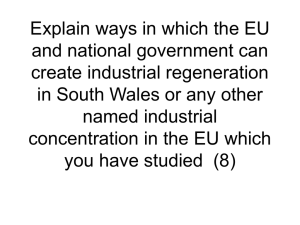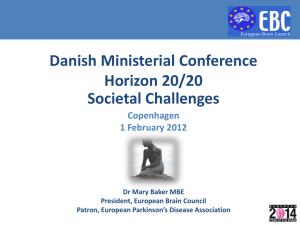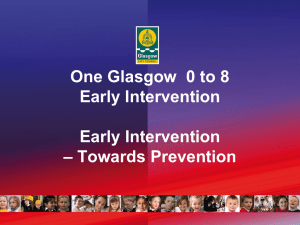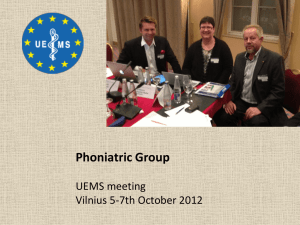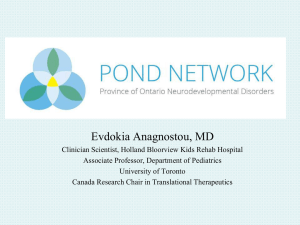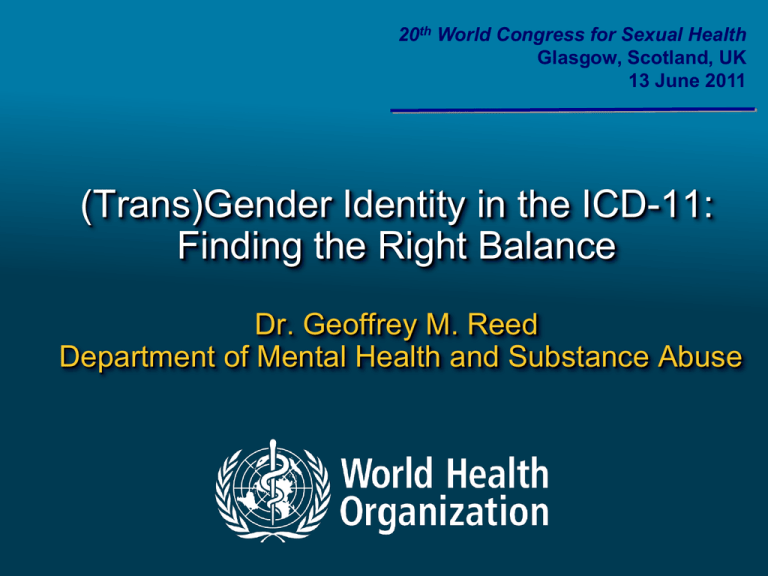
20th World Congress for Sexual Health
Glasgow, Scotland, UK
13 June 2011
(Trans)Gender Identity in the ICD-11:
Finding the Right Balance
Dr. Geoffrey M. Reed
Department of Mental Health and Substance Abuse
World Health Organization
2|
Glasgow, UK
|
13 June 2011
Specialized agency of UN established
in 1948
Mission of WHO is the attainment by
all peoples of the highest possible
level of health
From WHO's inception, health has
explicitly included mental health
Health classifications are core
constitutional responsibility of
WHO, ratified by treaty with 193
member countries
Purposes of ICD
WHO member countries agree to use ICD as standard
for health information and reporting
Basis for:
Assessment and monitoring of mortality, morbidity,
injuries, external causes, other health parameters
Tracking epidemics and disease burden
Identifying appropriate targets of health care resources
Accountability
3|
Glasgow, UK
|
13 June 2011
ICD-10 Revision
Mandated by World Health Assembly (Health Ministers of
all WHO Member Countries)
ICD-10 completed in 1990; longest time without revision in
history of ICD
Covers all areas of diseases, disorders, and injuries, and
health conditions; diagnostic standard for medicine
ICD revision process involves many international
professional associations, scientific societies, diseasebased groups; and advocacy organizations working on
behalf of ICD and WHO
4|
Glasgow, UK
|
13 June 2011
MSD Responsibilities
WHO Department of Mental Health and Substance Abuse
responsible for revision of:
– Mental and Behavioural Disorders
– Diseases of the Nervous System
Assisted by International Advisory Group in each area
Participate in Revision Steering Group for overall ICD revision
Technical work on Mental and Behavioural Disorders to be
completed by end of 2013
Approval of ICD-11 by World Health Assembly expected:
2014 – 2015
5|
Glasgow, UK
|
13 June 2011
Mental and Behavioural Disorders – I
1. Neurodevelopmental
disorders
2. Schizophrenia spectrum
and other primary
psychotic disorders
disorders
6. Obsessive-compulsive
and related disorders
7. Disorders associated with
severe stress or adversity
3. Bipolar and related
disorders
8. Dissociative disorders
4. Depressive disorders
9. Somatic distress disorders
5. Anxiety and fear-related
6|
Glasgow, UK
|
13 June 2011
Mental and Behavioural Disorders – II
10. Feeding and eating
disorders
addictive disorders
16. Neurocognitive disorders
11. Elimination disorders
17. Personality disorders
12. Sleep disorders
18. Paraphilias
13. Sexual dysfunctions
19. Other mental and
14. Disruptive behaviour and
behavioural disorders
antisocial disorders
15. Disorders due to
substance use and other
7 | Glasgow, UK | 13 June 2011
WHO ICD Constituencies
Member Countries
– Required to report health statistics to WHO according to ICD
– Use ICD categories for eligibility and payment of health
care, social, and disability benefits and services
Health Professionals
– Multiple mental health professions
– Most mental disorders treated in primary care, must be useful
for front-line service providers
Service Users/Consumers
– ‘Nothing about us without us!’
– Opportunities for substantive and continuing input
8|
Glasgow, UK
|
13 June 2011
ICD Revision Orienting Principles
1.
Highest goal is to help WHO member countries reduce
disease burden of mental and behavioural disorders:
relevance of ICD to public health
2.
Focus on clinical utility: facilitate identification and treatment
by global front-line health care providers, especially in low
and middle-income countries
3.
Multidisciplinary, global, multilingual development
4.
Must be undertaken in collaboration with stakeholders
5.
Integrity of system depends on independence from
pharmaceutical and other commercial influence
9|
Glasgow, UK
|
13 June 2011
The Treatment Gap
Mental disorders contribute heavily to global disability and
disease burden (WHO, 2008)
Serious mental disorders receiving no treatment during
past year:
– Developed countries- 35.5 to 50.3%
– Developing countries- 76.3 to 85.4%
(World Mental Health Survey Group, JAMA, 2004)
‘Treatment gap’ is 32 to 78%, depending on disorder
(Kohn, Saxena, Levav, Saraceno, Bull of WHO, 2004)
10 |
Glasgow, UK
|
13 June 2011
Lack of treatment leads to human rights abuses
11 |
Glasgow, UK
|
13 June 2011
Scarcity of Human Resources
(N=157 to 183 countries)
12 |
Glasgow, UK
|
13 June 2011
Importance of Primary Care
Worldwide, psychiatrists provide only a tiny proportion of
mental health services
When people with mental disorders do receive treatment,
they are far more likely to receive it in primary care settings
Mental health specialists alone cannot address treatment
gap
A primary focus of the ICD revision is to provide a version
of ICD-11 mental disorders classifications that is
feasible and clinically useful for primary care settings
13 |
Glasgow, UK
|
13 June 2011
Clinical Utility as Organizing Principle
The ideal: scientific validity and clinical utility
At present, neuroscience and genetics evidence
does not support major changes for individual
conditions or provide definitive support for
specific structure
WHO views current revision as major opportunity
to improve utility of the system
14 |
Glasgow, UK
|
13 June 2011
Clinical Utility: WHO Working Model
Clinical utility of concept relates to:
Value in communicating (e.g., among practitioners,
patients, families, administrators)
Implementation in clinical practice: Goodness of fit
(accuracy), ease of use, time required (feasbility)
Usefulness in selecting interventions and for clinical
management decisions
Improvement in clinical outcomes at individual level
and health status at population level
15 |
Glasgow, UK
|
13 June 2011
First Question
Should we have categories to represent transgender
phenomena as a part of a classification of health
conditions?
1. Tracking epidemics/threats to public health/disease
burden
2. To identify vulnerable/at risk populations
3. To define obligations of WHO Member States to provide
free or subsidized health care to their populations
4. To facilitate access to appropriate health care services
5. As a basis for guidelines for care and standards of
practice
16 |
Glasgow, UK
|
13 June 2011
First Question
Should we have categories to represent transgender
phenomena as a part of a classification of health
conditions?
1. Tracking epidemics/threats to public health/disease
burden
✔ 2.
✔ 3.
✔ 4.
✔ 5.
17 |
To identify vulnerable/at risk populations
To define obligations of WHO Member States to provide
free or subsidized health care to their populations
To facilitate access to appropriate health care services
As a basis for guidelines for care and standards of
practice
Glasgow, UK
|
13 June 2011
Second Question
How should category or categories related to transgender
phenomena be conceptualized?
Transsexualism? (ICD-10 F64)
A desire to live and be accepted as a member of the opposite sex,
usually accompanied by a sense of discomfort with, or
inappropriateness of, one's anatomic sex and a wish to have
hormonal treatment and surgery to make one's body as congruent
as possible with the preferred sex.
Gender identity disorder?
Gender incongruence?
Gender dysphoria?
Effects of social oppression related to transgender identity?
Same for adults and children?
18 |
Glasgow, UK
|
13 June 2011
Third Question
Where should categories related to transgender phenomena
be placed in the classification?
Mental and behavioural disorders?
Factors influencing health status and contact with health
services?
Signs and symptoms?
Reproductive health?
Sexual health?
Other?
19 |
Glasgow, UK
|
13 June 2011
Working Group
The WHO Department of Mental Health and Substance Abuse and
the WHO Department of Reproductive Health and Research will
appoint a Working Group on Sexual Disorders and Sexual Health
as part of the ICD revision process
Working Group will appoint jointly to the ICD Advisory Group for
Mental and Behavioural Disorders and the Advisory Group for
Reproductive Health
Will also provide liaison to the Pediatric Advisory Group and other
classification areas as appropriate
Charge is to review evidence, submitted proposals, and develop draft
of ICD-11 classification for consideration by Advisory Groups, public
comment, and field testing
20 |
Glasgow, UK
|
13 June 2011
Revision Proposals
Can be made by anyone
Proposal form and guide available in English,
Spanish, and French
Proposals may be submitted in these languages
Submit to reedg@who.int
Will be referred to appropriate Working Group
Should be received no later than December 31,
2011
21 |
Glasgow, UK
|
13 June 2011
Revision Proposals
22 |
Glasgow, UK
|
13 June 2011
Revision Proposals
23 |
Glasgow, UK
|
13 June 2011
Revision Proposals
24 |
Glasgow, UK
|
13 June 2011
Revision Proposals
To reflect changes in the social understanding or view of diseases
or disorders (e.g., removal of stigmatizing terms): This option
applies in situations in which terms used in the ICD-10 are
stigmatizing and may be considered demeaning by service users.
Examples include the terms ‘mental retardation’ and ‘dementia’. It
also may apply in situations where behavior that was previously
considered inherently disordered is now more broadly considered to
be normal variation in response and behavior, such as may apply to
some of the categories included under Disorders of sexual
preference (F65). It may also apply to proposals from various
consumer groups to move particular conditions out of the chapter
on Mental and Behavioural Disorders to another part of the ICD.
25 |
Glasgow, UK
|
13 June 2011
Revision Proposals
26 |
Glasgow, UK
|
13 June 2011
Revision Proposals
27 |
Glasgow, UK
|
13 June 2011
Required Content for
Each ICD-11 Category
IX.
X.
II. Relationship to ICD-10
XI.
III. Primary ‘Parent’ Category
XII.
IV. Secondary ‘Parent’
XIII.
Category
XIV.
V. ‘Children’ or Constituent XV.
Categories
XVI.
VI. Synonyms
XVII.
VII. Definition
XVIII.
VIII. Diagnostic Guidelines
XIX.
I.
Category Name
28 |
Glasgow, UK
|
13 June 2011
Functional Properties
Temporal Qualifiers
Severity Qualifiers
Differential Diagnosis
Differentiation from Normality
Developmental Presentations
Course Features
Associated Features and
Comorbidities
Culture-Related Features
Gender-Related Features
Assessment Issues
Conclusions – I
Major advances in scientific understanding and changes in
social attitudes over the past two decades regarding
transgender issues
Strong grass-roots and human rights movement
Suggestions that ICD-10 has been misused
WHO is not invested in maintaining a conceptualization of
transgender-linked health conditions as mental disorders
Most proposed alternative conceptualizations are still
pathological, and none is entirely satisfactory
29 |
Glasgow, UK
|
13 June 2011
Conclusions – II
We need a serious alternative proposal that:
facilitates appropriate access to non-coerced health care
Helps to protect human rights
Is scientifically defensible and grounded in evidence,
broadly defined
Has a reasonable chance of being broadly acceptable to
transgender people, to health care professionals, to
researchers, and to Member States
30 |
Glasgow, UK
|
13 June 2011

